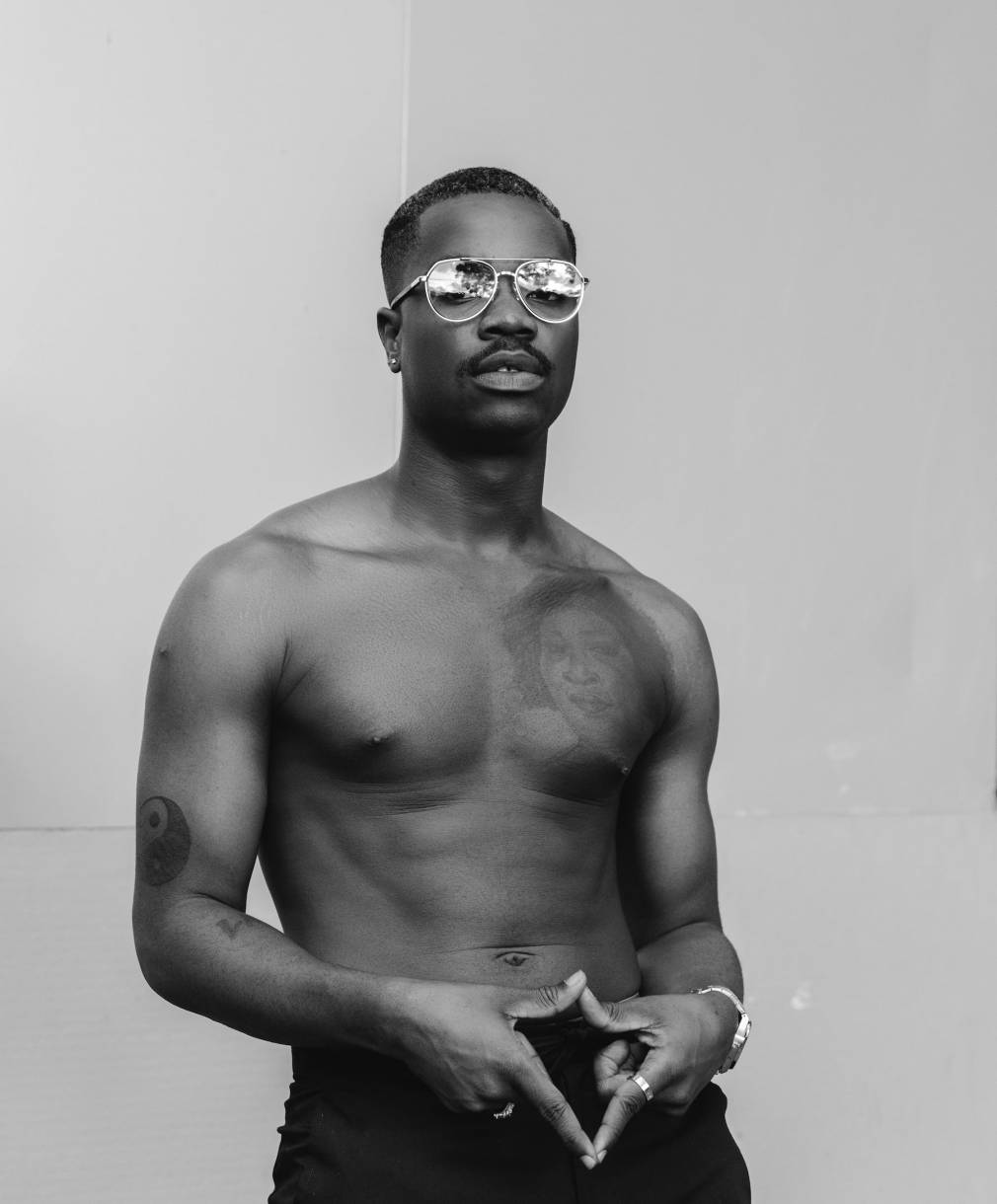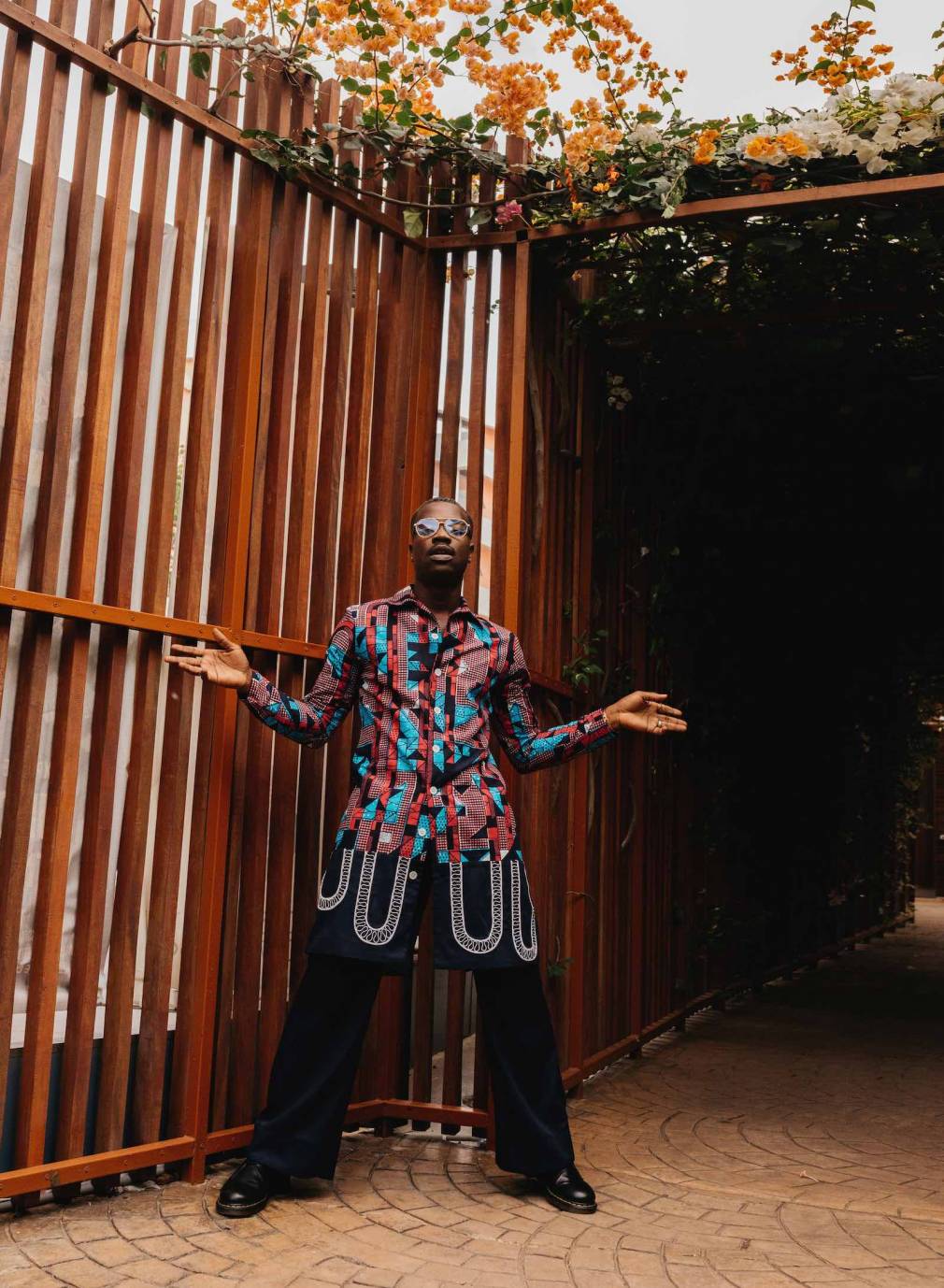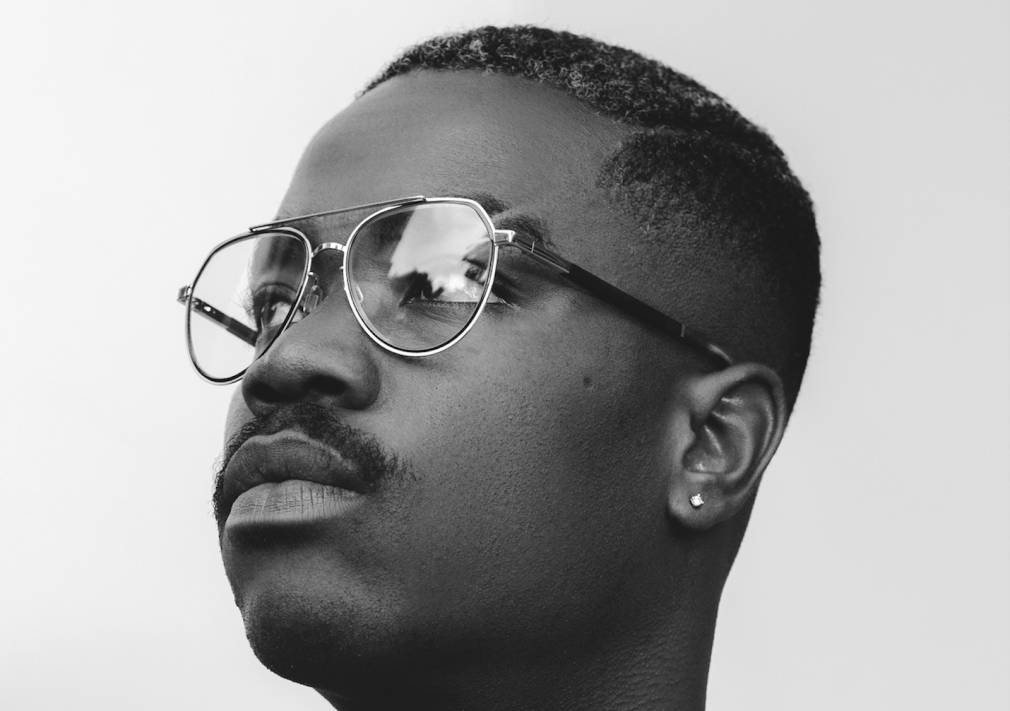Initiator of the Ghanian alternative movement and member of La Même Gang, Darkovibes joins forces with the who’s who of Accra and abroad for his new LP Kpanlogo.
“I grew up in Jamestown and Labadi. These are traditional Ga communities by the sea. There is a lot of singing and dancing for morale. Kpanlogo dance is the one I remember from when I was little. It’s fun and energetic”. The Kpanlogo dance and lightness of the sea appear to be starting points for Darkovibes’s career. Twenty-five years after his birth in Accra in 1995, he pays tribute to his roots with his first solo album Kpanlogo, released on April 3rd.
Journey of a child from Accra
Water has flown under the bridge since the time the young Paul Nii Amu Andrew Darko was dancing carefree with his group of friends, the La Même Gang. Since he has toured the West African stages and played a major role in putting Accra on the map in a booming industry. His music is described as a potpourri of rap, Afrobeats, highlife, English, pidgin, Ga and Twi. With ingredients like that, the final product is inevitably tasty. PAM met the man who is rightly nicknamed Cool Paul to look back on his career and discuss his new project.
In an interview for Redbull, KwakuBS, a close friend of Darkovibes, explained that “Ghanaians have very strong opinions, especially in terms of morals. You can’t look a certain way, you can’t give a brother a hug”. Cool Paul clearly stands out in this landscape: tattooed, changing his hair colour almost every week, dressed like the most stylish fashionista (he hates the term), hanging out with skaters, his lifestyle is seen by some as provocative.
However, the explanation can be found in his childhood, spent in Accra in the Labadi and Jamestown neighbourhoods. Both areas have very unique histories and characters in the city’s landscape – Jamestown has been cited as one of the coolest African neighbourhoods on the continent. “In both communities uniqueness is celebrated, so we grew up being interested in many things,” the artist explains. “I, for example, have always been curious about music, and I remember arguing with my friends about who heard a record first once it was out, especially with rap music”. He also mentions it was these two places that taught him what he calls his “heritage” and exposed him to RnB, Reggae, Highlife, Hiplife or soul, depending on what was on the radio and TV.
Since childhood, he “interprets” all the sounds he hears as music; in his first year of university, he decided to take serious action. There was no particular divine revelation : “I chose music as my true calling. I knew I was ready to do it, so I put all ten toes down and just did it”. He then started going to the Villain Sounds studios and met $pacely, Nxwrth, KwakuBS, Kiddblack and RJZ, his future colleagues of La Même Gang. The young men immediately got along: same look, same style, same passions, same ambitions. What is the probability of meeting 5 youngsters with totally similar visions when you are a green-haired Ga artist in Accra? “Alignment!” is the artist’s explanation. “None of it was planned. We were just always in the studio creating, harnessing each other’s strengths. It was a beautiful time”. These six friends form the collective La Même Gang, where music, fashion, visual arts and culture overlap. “I always say that we are like the Power Rangers,” Darkovibes adds. “We have our individual superpowers and function 100 percent in our element, but sometimes, we come together to do things on another level”.
Breaking artistic barriers
The La Même Gang members quickly become ambassadors of a young, trendy lifestyle free of complexes and contrasting heavily with the Christian and conservative rigour that exists in certain parts of Ghanaian society. The 6 rappers are all tattooed, wear ultra-flashy dyes, skateboard and curse in their lyrics. In short, they have fun and don’t let anyone stop them.
Darkovibes explains that the group effect contributed to their style: “We’re all rebels, and because we were always cooked up in the studio, we bounced all our ideas off each other. Doing that was what created the sound people refer to as alternative”. The beginnings were difficult, but the young men “had each other” and trusted their talent. They didn’t take notice when critics were shocked by their exuberance. “They used to call us twitter artists. We embraced that label and kept it moving. We were creating the music for us, music we thought was cool, we didn’t care about what the dominating sound was. We were loud and disruptive, and our lifestyle was very infectious. Everything about us is provocative: you either follow us heavy or you don’t, there’s no middle ground. And people made their choices”.
The team released a mixtape in 2017 (“La Même Tape”) and 2018 (“La Même Tape: Linksters”), which quickly propelled them to the forefront of the Ghanaian scene, allowing them to do concerts and appearances all over the country. In February 2020, they were invited to perform at the SXSW festival in Austin, Texas (which was later cancelled). At the same time, the members do countless collaborations with their peers, who all rise together: Joey B, Kwesi Arthur, B4Bonah, Kuvie… Accra got organized and everyone helps each other in this joyful dynamic that rubs off on the whole Ghanaian art world.
Indeed, united by the ambition to disrupt norms, actors in the music, fashion and visual arts worlds join forces. It is very common to see fashion collectives like Free The Youth, The Weird Cult, or specific directors and filmmakers gravitating around La Même Gang. To describe this interdisciplinary wave electrifying Accra, Darkovibes, who also has a foot in fashion, says, “birds of a feather flock together”. He explains: “It’s a pace and movement that’s growing. There is little money in these industries, and no form of capacity building for interested individuals. There is no structured institution that teaches these things in Ghana. People only learn by experience. But we’re enjoying the process, and I guess it makes the journey richer”.

Kpanlogo, starting local going global
On April 3rd, Darkovibes released his album Kpanlogo while his single “Inna Song (Gin & Lime)” was already number 1 in the country. One can hardly describe the project as a rap album: Darkovibes describes his musical style as “Feels”. Tracks like “Emotional”, “Different”, “Mama Cee”, or “Medaase” are clearly reminiscent of highlife or hiplife, while most of the other tracks sound more like Afrobeats, rap or dancehall revisited. “This album was made with Ghanaians in mind and to showcase Ghana to the world,” the artist explains. “There is a lot of highlife music in there, and traditional songs that Ghanaians will connect to on a deeper level”.
Darkovibes has succeeded in making something new out of the old and rewriting Ghana’s future with inspiration from the past. Afrobeats rhythms blend perfectly with the swaying highlife guitars and the artist has taken his vocal mastery to the next level, while interludes of Ga music punctuate the track list. “You can never really leave your roots”, he comments. He has also invited the best among Ghanaian artists to feature (Kwesi Arthur, Stonebwoy, Mugeez, Joey B, King Promise) as well as some Nigerian superstars (Peruzzi, Runtown, Mr Eazi). A track in collaboration with the one and only Wizkid was also supposed to be on the project, but Darkovibes “didn’t like the final sound” and therefore didn’t include it.
The artist is now established at home and the modern and resolutely Ghanaian music he managed to create is beginning to cross borders. Just like the highlife of the early days, it is starting to resonate in Nigeria. “Nigeria has its own sauce and we have our own,” he says. “But I listen to a lot of Nigerian music and I have a lot of friends there”. Darkovibes is also beginning to have some success in Europe, especially in the United Kingdom, where the Ghanaian diaspora represents a significant part of the population. “The UK is like an African country on another continent. And no matter where we go in this world, we are bound to get some love because Africans are everywhere. My music is for everyone, everywhere. It’s about the flow and emotions, and that knows no borders,” he concludes. Considering Accra is the most fashionable destination of 2020, his foresight is clear.

